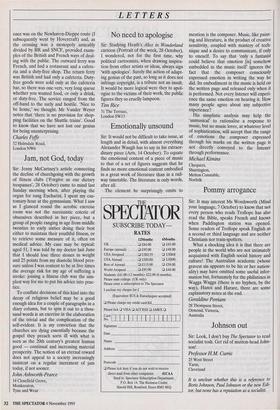Emotionally unsound
Sir: It would not be difficult to take issue, at length and in detail, with almost everything Alexander Waugh has to say in his extraor- dinary piece (Arts, 14 October). To equate the emotional content of a piece of music to that of a set of figures suggests that he finds no more emotional content embodied in a great work of literature than in a rail- way timetable. The literature is only words, after all.
The element he surprisingly omits to mention is the composer. Music, like paint- ing and literature, is the product of creative sensitivity, coupled with mastery of tech- nique and a desire to communicate, if only to oneself. To say that 'only a fantasist could believe that emotion [is] somehow embedded in the music itself' ignores the fact that the composer consciously expressed emotion in writing the way he did. Its embodiment in the music is held on the written page and released only when it is performed. Not every listener will experi- ence the same emotion on hearing it. How many people agree about any subjective experience?
His simplistic analysis may help the `unmusical' to rationalise a response to music, but no music lover, at whatever level of sophistication, will accept that the range of emotions the composer expressed through his marks on the written page is not directly conveyed to the listener through performance.
Michael Kimins
Chequers, Sharrington, Melton Constable, Norfolk










































































 Previous page
Previous page